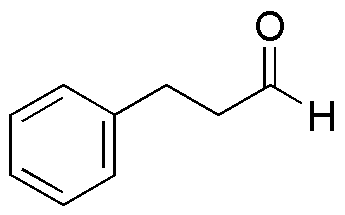Hydrocinnamaldehyde is widely utilized in research focused on:
- Flavor and Fragrance Industry: This compound is commonly used as a flavoring agent in food products and as a fragrance component in cosmetics and personal care items, providing a sweet, floral aroma that enhances sensory appeal.
- Pharmaceuticals: It has potential applications in drug formulation, particularly in the development of anti-inflammatory and antimicrobial agents, due to its bioactive properties that can support therapeutic effects.
- Natural Products Chemistry: Researchers often explore hydrocinnamaldehyde for its role in synthesizing various natural products, which can lead to the discovery of new compounds with beneficial properties.
- Cosmetic Formulations: Its ability to act as a natural preservative makes it valuable in cosmetic products, helping to extend shelf life while maintaining product integrity.
- Aromatherapy: The compound is also used in essential oils and aromatherapy products, where its pleasant scent is believed to promote relaxation and improve mood.
Informations générales
Propriétés
Sécurité et réglementation
Applications
Hydrocinnamaldehyde is widely utilized in research focused on:
- Flavor and Fragrance Industry: This compound is commonly used as a flavoring agent in food products and as a fragrance component in cosmetics and personal care items, providing a sweet, floral aroma that enhances sensory appeal.
- Pharmaceuticals: It has potential applications in drug formulation, particularly in the development of anti-inflammatory and antimicrobial agents, due to its bioactive properties that can support therapeutic effects.
- Natural Products Chemistry: Researchers often explore hydrocinnamaldehyde for its role in synthesizing various natural products, which can lead to the discovery of new compounds with beneficial properties.
- Cosmetic Formulations: Its ability to act as a natural preservative makes it valuable in cosmetic products, helping to extend shelf life while maintaining product integrity.
- Aromatherapy: The compound is also used in essential oils and aromatherapy products, where its pleasant scent is believed to promote relaxation and improve mood.
Documents
Fiches de données de sécurité (FDS)
La FDS fournit des informations de sécurité complètes sur la manipulation, le stockage et l’élimination du produit.
Spécifications du produit (PS)
Le PS fournit une description complète des propriétés du produit, notamment sa composition chimique, son état physique, sa pureté et les exigences de stockage. Il détaille également les plages de qualité acceptables et les applications prévues du produit.
Certificats d'analyse (COA)
Recherchez des certificats d'analyse (COA) en saisissant le numéro de lot du produit. Les numéros de lot et de lot se trouvent sur l'étiquette d'un produit, après les mots « Lot » ou « Lot de fabrication ».
Numéro de catalogue
Numéro de lot/série
Certificats d'origine (COO)
Ce certificat d'exploitation confirme le pays dans lequel le produit a été fabriqué, et détaille également les matériaux et composants utilisés et s'il est issu de sources naturelles, synthétiques ou autres sources spécifiques. Ce certificat peut être requis pour les douanes, le commerce et la conformité réglementaire.
Numéro de catalogue
Numéro de lot/série
Fiches de données de sécurité (FDS)
La FDS fournit des informations de sécurité complètes sur la manipulation, le stockage et l’élimination du produit.
DownloadSpécifications du produit (PS)
Le PS fournit une description complète des propriétés du produit, notamment sa composition chimique, son état physique, sa pureté et les exigences de stockage. Il détaille également les plages de qualité acceptables et les applications prévues du produit.
DownloadCertificats d'analyse (COA)
Recherchez des certificats d'analyse (COA) en saisissant le numéro de lot du produit. Les numéros de lot et de lot se trouvent sur l'étiquette d'un produit, après les mots « Lot » ou « Lot de fabrication ».
Numéro de catalogue
Numéro de lot/série
Certificats d'origine (COO)
Ce certificat d'exploitation confirme le pays dans lequel le produit a été fabriqué, et détaille également les matériaux et composants utilisés et s'il est issu de sources naturelles, synthétiques ou autres sources spécifiques. Ce certificat peut être requis pour les douanes, le commerce et la conformité réglementaire.


